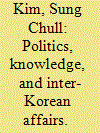| Srl | Item |
| 1 |
ID:
132046


|
|
|
|
|
| Publication |
2014.
|
| Summary/Abstract |
With rapid China now the world's second-largest economy, the status and Wrole of China's think tanks have become an increasing concern. On the whole, the international status of China' s think tanks is not
commensurate with the country' s current international status. The University of Pennsylvania' s The Global Go To Think Tanks Report published in 2014 said that as of August 2013, China had 426 think tanks, second only to the U.S. with 1,828. But of the top 100 non-U.,S. think tanks in the world only 5 are Chinese, and in the 150 most in?uential global think tanks, only 6 are from China-with the rest mostly from Europe. China' s think tanks lack professionalism and in?uence.' This is why China has been pushing to improve its think tanks internationally. In April 2013, President Xi Jinping proposed building a "new think tank with Chinese characteristics". To date this has been the clearest statement from a leader of China on think tanks? Decision of the CCCPC on Some Major Issues Conceming Comprehensively Deepening the Reform was passed in the 3rd Plenary Session of the 18th CPC Central Committee held in 2013. It clearly proposed"the building of new think tanks with Chinese characteristics and developing
a sound decision-making advisory system". China' s think tanks must make an international transition, but how can they do this'? What specific challenges are there? This paper will analyze these questions.
|
|
|
|
|
|
|
|
|
|
|
|
|
|
|
|
| 2 |
ID:
130614


|
|
|
|
|
| Publication |
2014.
|
| Summary/Abstract |
Throughout much of history the Institute a/'/international Relations /[IR] has been perceived as a Kuomintang think tank. Based an the perspective generated by personal contributions (before its formal establishment in 1975as part of National Chengchi University, the author tracer the IIR's foundations and key staff as far back as 1937 to argue that is was constructed during a national crisis because the state leader needed professional opinions that could be used strategically. Thus rather than considering the IIR as an organization subject to a political party. it should be regarded as on institution charged with gathering scholars to defend the country.
|
|
|
|
|
|
|
|
|
|
|
|
|
|
|
|
| 3 |
ID:
130623


|
|
|
|
|
| Publication |
2014.
|
| Summary/Abstract |
There were four critical undercurrents for the growth of Korean think tank in the 1990s: democratization. the end o/the Cold War. _globalization coupled with local autonomy, and the expanded government budget accompanying Korea's rapid economic growth. In contrast to American think tanks which are private but normally server as public policy advocates, most of the important Korean think tanks are supported by the government and they are not independent public policy advocates. the Korean think tanks are highly susceptible to domestic political dynamics for instance, the presidential office's power over the over the appointment of directors.
|
|
|
|
|
|
|
|
|
|
|
|
|
|
|
|